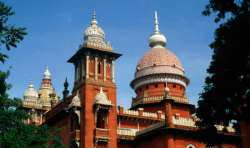Madras HC makes singing Vande Mataram mandatory across offices and educational institutions in Tamil Nadu
The national song will have to be compulsorily played and sung at least once a week at all institutions and once a month at offices, the court ruled

The Madras High Court on Tuesday made singing Vande Mataram mandatory for schools, government offices, private entities and industry. The national song needs to be compulsorily sung at least once a week in schools and once in a month in offices, the court has ruled.
Observing that the youth of this country are the future of tomorrow, Justice M V Muralidharan expressed hope that the order is taken in the right spirit and implemented in letter and spirit by the citizenry. Justice Muralidharan said Vande Mataram is to be played and sung in all schools, colleges and Universities at least once a week, preferably on Monday or Friday. For government offices, private companies, factories and industries, the court has instructed that the national song be played and sung at least once a month.
Noting that if people had difficulties singing the song in Bengali or Sanskrit, the court also directed the Director of Public Information to upload the translated version of Vande Mataram in Tamil and English on government websites and social media handles.
The court further observed that in the event of an individual or organization has difficulties in singing Vande Mataram, he or she shall not be compelled or forced, provided there are valid reasons for not doing so.
The court’s decision came on a plea by one K Veeramani who failed to clear a test conducted by the Teachers Training Board by one mark. The petitioner stated that he scored 89 marks, one mark short of the 90 required to qualify for consideration for the post of BT Assistant. He further contended that he lost out on the opportunity because he answered ‘Bengali’ to a question on the language of Vande Mataram.
However, the petitioner contended in court that he had read in many books that the song was written in Bengali and that the Teachers Recruitment Board had erred by saying in its answer key that the song was in Sanskrit. The government, on the other hand, contended that the song was originally written in Sanskrit and was later translated in Bengali.
The court then asked the Advocate General to clear the confusion and come up with the right answer. On July 13, the AG informed the court that the original language of Vande Mataram was Sanskrit, which was written in Bengali script. The court has now asked the government to include the petitioner’s name for consideration for the said post.